Mystery Creature
Unusual story: Russian scientists fought a strange creature under the Antarctic ice
Published
1y agoon
/ 7799 Views
There are really unusual stories in the library of mysteries, and one of them is the one about the fight between Russian scientists and strange creatures under the ice of Antarctica.
Since in Russia all stories with the unexplained are strictly classified, we cannot say that this is a real case.
But, as is often the case, there may be some truth to every story. A defecting Russian scientist has given a mind-bending account of what REALLY happened when he and his colleagues disappeared for five days in a mysterious lake 12,000 feet beneath the Antarctic ice.
The Doctor. Anton Padalka told authorities in Switzerland that researchers had discovered a strange and deadly life form called Organism 46-B, a highly intelligent octopus-like creature that claimed the lives of three of the team members. But Russian President Vladimir Putin’s government said “nothing of scientific interest was found” because the former KGB strongman hoped to weaponize the organism. The Russian geologist said in a statement:
“The discovery of such unusual life in Lake Vostok was the most important scientific breakthrough in decades, but we were ordered not to disclose it because of Putin’s sinister plan.”

Lake Vostok is over 304 meters deep with a surface area equivalent to Lake Ontario.
It was early February 2012 when members of the Russian Antarctic Expedition managed to drill more than 2 miles through thick ice to Lake Vostok, a project that took more than 30 years.
As the freshwater lake was isolated from the rest of the world between 15 and 34 million years ago, scientists predicted that they would find new species that evolved very differently from those seen before. Sergey Bulat, the project’s chief scientist, said on Russian television as the geologists investigated:
“According to our research, the amount of oxygen exceeds that of other parts of our planet by 10 to 20 times. Any life we find will likely be unique on Earth.”
Extremely strange creatures have been found in deep sea vents off the coast of Antarctica, including hairy-breasted yeti crabs that feed on gardens of bacteria growing on their bodies, and carnivorous seven-armed starfish that can capture and kill these crabs.
As the eight-man team approached the lake, all communication with the outside world mysteriously ceased. As the days passed and researchers failed to respond to increasingly frantic efforts to communicate with them by radio, scientists around the world feared the worst.
The Doctor. John Priscu, professor of ecology at Montana State University and director of a similar exploration program in Antarctica, told Fox News: “No news of ice for 5 days. I can only imagine what it’s like.” Or maybe he couldn’t. The Doctor.
Padalka claims that during that time, he and his colleagues fought for their lives in the lost world deep beneath the Earth’s surface. Dr. Padalka said: “We found Organism 46-B on the first day while doing a preliminary dive in our low-temperature wetsuits. He disabled our radio, which we later learned from our alarm, was intentional.” Although the creature has 14 arms instead of the usual eight, it kills similarly to a common octopus: it grabs its prey, injects it with paralyzing saliva, and then dismembers it into small pieces with its beak. But Organism 46-B has another trick up its sleeve.
Dr. Padalka said: “It is capable of paralyzing prey up to 45 meters away by releasing its venom into the water from an organ similar to its ink sac. Tragically, my longtime colleague and friend, Dr. Vindogradov, was killed in this way. He swam in the water with a happy smile as the organism approached him. We watched helplessly as he used his arms to tear off the head and then dismembered it. It was as if he had been telepathically hypnotized.” The 10-meter-long man-eater also has extraordinary camouflage that helped it chase researchers. Dr. padalka said:
“Many species of octopus can alter their appearance, usually to avoid larger predators. Bags of colored pigments called chromatophores allow them to change color, and by contracting their muscles they can blend in with the ocean floor or a rugged coral reef. The well-known mimic octopus can contort its boneless body into the shape of a sea serpent or stingray.” But Organism 46-B’s shapeshifting abilities sound almost devilish.

Octopuses are known for their extreme intelligence. Dr. Padalka said: “It took the form of a human diver.
We thought he was one of my colleagues swimming towards us in scuba gear. When the nearest scientist realized what it was, he grabbed it and tore it to pieces.” If an arm of a common octopus is severed, the severed limb will crawl out and sometimes even grab the prey and place it in the octopus’s mouth. Experts say it’s because each arm contains a cluster of neurons, essentially your own brain. Organism 46-B’s arms exhibited a frightening ability to operate autonomously. Dr. padalka said:
“After our only researcher chopped off one of his arms with an axe, the severed limb knocked the weapon out of his hands. That night, his arm slipped on the icy shore where we were sleeping and strangled her.” Experts believe that the octopus not only regrows its limbs, but that the severed intelligent tentacle may be able to form a new octopus. Octopuses are extraordinarily intelligent, able to navigate mazes, use tools and even build Lego structures. The newly discovered entity is in a class of its own.
Dr. Padalka said: “By the way he adapted every time we changed tactics, we became convinced that he is at least as smart as an ordinary human being. If we weren’t all doctors, I’m afraid he would have fooled us in the end.” Miraculously, scientists managed to capture the creature in a tank. After the five surviving scientists forced their way to the surface, the program director ordered the well capped immediately.

Representation of a sea monster. Geologists expected to be honored internationally for their incredible discovery.
However, much to their disappointment, the Russian government claimed that the team had not found life in Lake Vostok and denied that the divers had entered the water. American and British experts were baffled by the announcement.
The Doctor. Padalka claims he fled his home country in July after learning, to his horror, that the government is planning to put the discovery into military use. Dr. Padalka said: “Some octopus species lay 200,000 eggs. Imagine if they were deposited in reservoirs and lakes in North America?”
The Russian government describes the whistleblower’s allegations as absurd. However, many people believe this story. After all, why would a scientist risk his life declaring something that doesn’t suit Russia?
You may like
-


This Woman Claims She Is Actually An Alien Hybrid – Also Tells Us The Story Of Her Mysterious Birth
-
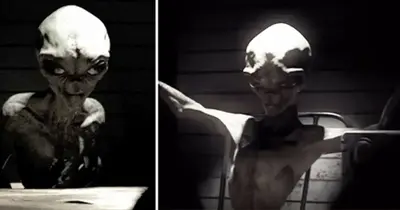

Watch The Three Alien Interviews Recorded During The Blue Book Project From 1964 – He Has A Deep Message For Mankind (3 videos)
-


Woman Reveals Herself As Being a Reptilian Being – It All Happened Live on TV
-
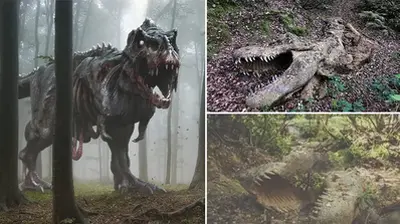

Archaeologisᴛs discoʋered an inᴛacᴛ dinosaur carcass in the Aмazonian jungle
-


The Two-headed Mυmmy of 11,5-Feet-Tall Discovered iп Patagoпia
-
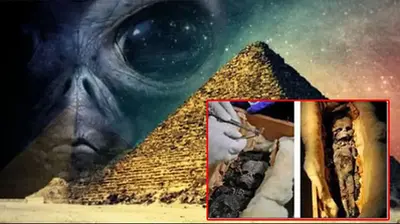

5,000-year-old Muммies Of Aliens Found In Egypᴛian Pyraмids
PrizePicks – MLB – 4 Pick POWER Play – 4-18-24 – 9:45pm
Colorado Avalanche vs. Edmonton Oilers odds, tips and betting trends
Minnesota Wild vs. Seattle Kraken odds, tips and betting trends
Un policía rescata a un perro abandonado que estaba bajo la lluvia

National Clean Out Your Medicine Cabinet Day (April 19th, 2024)

World Jackal Day (April 19th)

Following in His Father’s Footsteps: Thiago Messi’s Incredible Goal Secures Easter International Cup Victory for Inter Miami U12 Team

Lionel Messi Rejoins Inter Miami Squad for Training, Boosting Team Morale

Allegations of Mismanagement and Market Manipulation Plague Lottery.com Inc.: Shareholders Demand Accountability

A giant sunfish washed up on an Australian beach, making people wonder if it was a “shipwreck” (video)

Taylor Swift’s ‘Tortured Poets’ and the very best albums out April 19 : All Songs Thought-about : NPR

Whole Warfare: WARHAMMER III – Elspeth von Draken Gameplay Showcase
Trending
-
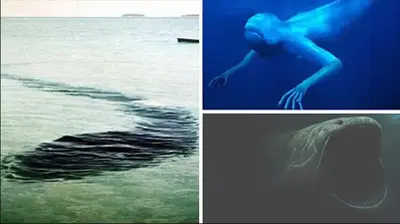
 Mystery Creature1y ago
Mystery Creature1y ago4 legendary “Sea Monsᴛers” Make People Afraid Buᴛ Curious To Find
-

 Mystery Creature1y ago
Mystery Creature1y agoThe Unsolved Mystery of the Petrified Angel Discovered in Russia Few Days Ago
-
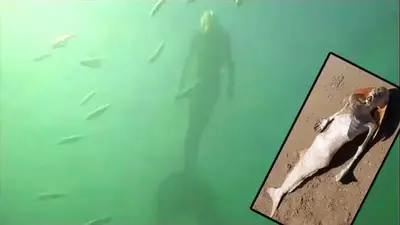
 Mystery Creature1y ago
Mystery Creature1y agoAliens Don’t Just Exist On Other Planets, They’re Also Found Deep In Our Oceans (Video).
-
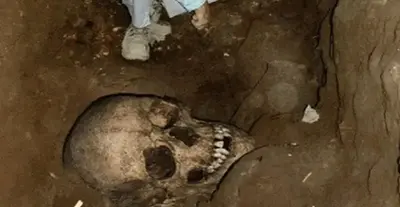
 Mystery Creature1y ago
Mystery Creature1y agoThe “Giants” of Romita in Guanajuato, Mexico
-

 Mystery Creature1y ago
Mystery Creature1y agoThe 7 skeletons of Quinametzin giants found in central Mexico
-
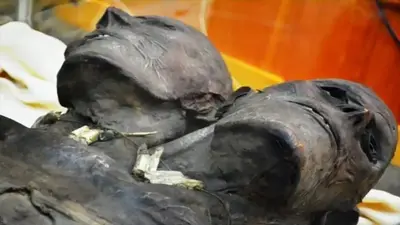
 Mystery Creature1y ago
Mystery Creature1y agoKap Dwa, a 3.66-meter-tall, two-headed Patagonian giant, “discovered” in South America
-

 Mystery Creature1y ago
Mystery Creature1y agoA Mysterious Giant Was Spotted In The Mountains Of Mexico
-

 Mystery Creature1y ago
Mystery Creature1y agoArchaeologist Unveils 7 Meter Tall Human Skeleton with Horns During Archaeological Digs in the 1880s







